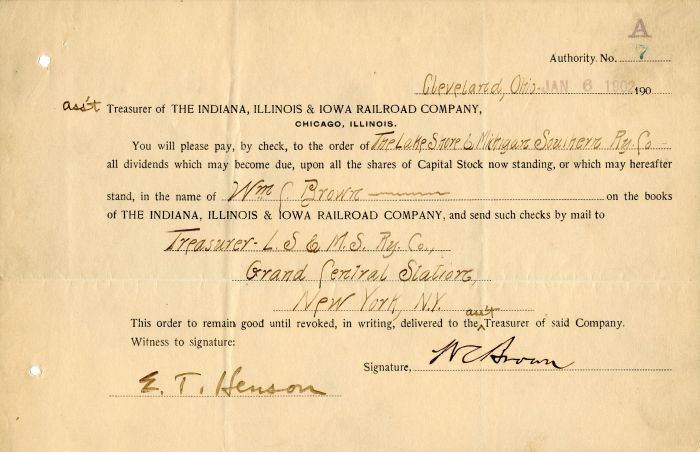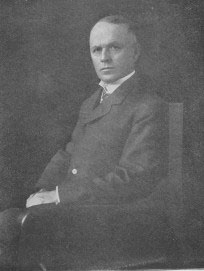Indiana, Illinois and Iowa Railroad Co. Issued to and Signed by Wm. C. Brown - Stock Certificate
Inv# AG2288 Stock
Indiana
Iowa
New York
Stock issued to and signed by Wm. C. Brown.

After his successful 19th century career with railroads in the Midwest, in 1902 William Carlos (or W.C.) Brown, became the Vice President in charge of the transportation, engineering, mechanical and purchasing departments of the New York Central Railroad, which as described in a prior post was one of the most powerful corporations in the country.
Brown’s joining the Central in 1902 prompted a letter writer to the New York Times to state that W.C. “has made a careful study of [railroad] safety appliances, and he is in large part responsible for the adoption of the operating rules now in force on [U.S. railroads]. He was a member of the first Committee on Safety Appliances and Train Rules of the American Railway Association.” In addition, according to this writer, Brown had a “strong and vigorous personality and he has a faculty of making friends with all of his employees.”
Brown was a Vice President until 1906, when he was promoted to the position of the Senior Vice President. He held this position until 1909 when he was appointed to be the Central’s President, Director and member of its Executive Committee. Effective December 31, 1913, he retired from the Central.
When Brown assumed the Central’s presidency in 1909, a trade journal said W.C. was “a studious man, clear-headed, with retentive memory” and “an accurate judge of men and subjects.”
The New York Times added that Brown was “one of the most popular railroad officials” in the U.S. and had “an extraordinary forcefulness and energy. He has a faculty of disposing of things in the shortest possible span of time, and an equally strong one for analyzing propositions down to the backbone. He talks quickly, energetically, and very clearly. Among his subordinates and associates he is immensely popular, and the joy over his promotion is heartfelt and unaffected.” He also was described as “courteous and modest . . . [a] moderate disciplinarian . . . kind-hearted and considerate . . . [and] not as uncompromising as many of his contemporaries [toward labor unions].”
Another journalist in 1909 said Brown “knows what the duty is of every one of his 150,000 men in the system.” The National Cyclopedia of American Biography in its 1910 edition stated that Brown was then “probably one of the best posted and most able and efficient railroad men in the [U.S.] He is firm and determined . . . . His career affords a splendid example of accomplishments due to untiring industry, perseverance, and fidelity to one’s duties.”
Brown himself was quoted in the New York Times at the time of his promotion to President of the Central. He said, “ In the United States, it is the workingman who, even though he starts at the bottom, ends in the important posts at the top of our railroads and our great industrial enterprises. The day of favoritism and family has departed. I believe that plain sticking to it is a good rule for every workingman who is earnest in his ambition. I believe, too, it may not be for his best welfare for any worker to set for himself . . . a definite goal.”
For another publication, Brown continued on this theme. He said the most important factor his advancement was, “Just sticking to it and making a business of my business, filling every job I got as well as I knew how. . . . [I]t is more or less a mistake to preach to young men that they should fix for themselves a specific goal, and strive toward it . . . . If a fellow sets out with that idea, he is apt to become an office politician, and he wastes more time figuring out how he is going to get the step over somebody else than he expends in attending to the business in hand. The thing he has to do is bend every energy . . . to doing today, as well as it can be done, what he has to do. The man who does that does not need to worry about promotion . . . . Promotion will look for him.”
During this time at the Central, Brown and his family lived in Manhattan at 135 Central Park West overlooking Central Park. But every summer he and his family returned to Iowa to visit his parents and friends and his farms. These visits along with other ways he honored his parents will be discussed in a subsequent post.
A stock certificate is issued by businesses, usually companies. A stock is part of the permanent finance of a business. Normally, they are never repaid, and the investor can recover his/her money only by selling to another investor. Most stocks, or also called shares, earn dividends, at the business's discretion, depending on how well it has traded. A stockholder or shareholder is a part-owner of the business that issued the stock certificates.









Ebay ID: labarre_galleries